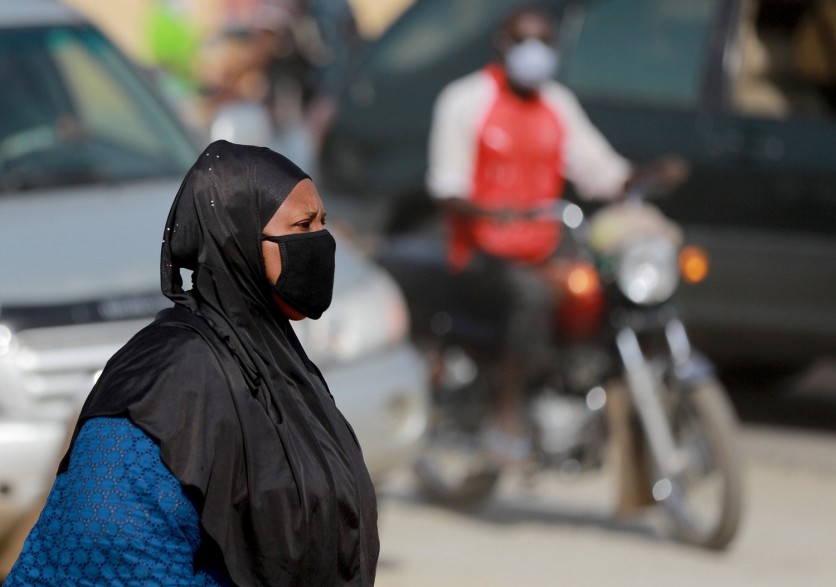Dr. Amarachukwu Allison shared how scared she was when she examined the Italian patient who turned out to be Nigeria's first coronavirus case.
In an interview via Instagram, Dr. Allison talked about how she met the Italian man who walked into her consulting room in Ogun state, southwest Nigeria in February. He was complaining of fever, headache, and fatigue, so immediately suspected what his ailment was.

A woman wears a face mask at Dutse Alhaji market, as authorities race to contain the coronavirus disease (COVID-19) in Abuja, Nigeria May 2, 2020.
The world was just waking up to the horrid reality of Covid-19, which by then has halted the economies and societies as a whole.
"I had been following the news trends at the time,, so when he walked into my consulting room with his complaints, he had a fever, it was high grade, headache, muscle pain, and fatigue. I took his medical history, and he said he had just come from Italy ... so I knew it was likely Covid-19," she told CNN, adding that the Italian patient has arrived from Milan within 48 hours before the visit.
Trying not to panic, Allison said she gave the man a face mask before isolating him.
'It was a really scary experience'
The 32-year-old doctor did not know then that she just detected Nigeria's first confirmed case of coronavirus. Her quick thinking earned praises from many Nigerians for helping to contain the spread of the virus in Africa's most populous nation.
Similarly, the Ogun government recently celebrated Allison and hailed her "singular brilliance."
"The Ogun State Government appreciates the young female doctor who suspected the index case in Nigeria in our State, Dr. Amarachukwu Karen Allison of Lafarge Nigeria. Her singular brilliance led to the early diagnosis and rapid containment of the first Covid-19 infection," the Ogun Ministry of Health said in a tweet.
After that, Allison was put on quarantine while the patient was transferred to an isolation center in the neighboring city of Lagos.
"It was a really scary experience, and I am so thankful that I tested negative," said Allison. It was her third experience of being quarantined. The first was during the Ebola outbreak when she had secondary contact, then las November, she was exposed to viral hemorrhagic fever.
"I thought to myself, 'What is happening?' and I had to call my parents. My organization brought a psychologist to call in every day to support us, and I cried a lot," she recalled.
Cases shoot up
Despite Allison's efforts, the coronavirus saw a sharp increase to 3526 confirmed cases as of May 8, with 601 recovered cases and 107 deaths, based on Nigeria Centre for Disease Control (NCDC).
The Ogun State Government appreciates the young female doctor who suspected the index case in Nigeria in our State, Dr. Amarachukwu Karen Allison of Lafarge Nigeria. Her singular brillaince led to the early diagnosis and rapid containment of the first Covid-19 infection in — OgunCovid-19Update (@OgunCovid19) March 21, 2020
However, there were rumors that the official numbers are not accurate because only over 22,000 samples have been tested. This is less than 1% of the estimated 200 million population.
Allison, who works as a site Medical Officer at International SOS, acknowledges how difficult the pandemic is for any government and individual anywhere.
"Everybody is trying to do the best that they can and as much as they can to handle things," said Allison saying they. are not only dealing with the pandemic but also with poverty.
Nigeria has been put on lockdown, hoping to contain the virus. However, President Muhammadu Buhari is looking at easing the restrictions after five weeks to get the nation's economy going again.
A 'hero' doctor
After detecting the country's first coronavirus case, Allison is being compared to Dr. Stella Adadevoh, who detected Nigeria's first case of Ebola in July 2014.
Adadevoh suspected Liberian national Patrick Sawyer had Ebola when he arrived at her hospital in Lagos, and successfully kept him there despite resistance from him and pressure from government officials to release him from the hospital.
While Adadevoh succumbed to the Ebola virus while in quarantine and died August 19, 2014, she consequently saved this country from a mass outbreak of Ebola.
Asked how she feels about being compared to Adadevoh, she said: "It makes me feel humbled and honored. I am thankful to her for what she did."
"It makes me happy when my fellow human beings appreciate me. I feel loved," she said.
Allison also advised the public to remain vigilant and conscious of their health as the lockdown is set to be lifted.
"As the lockdown is being eased, we the people need to play a role in stopping the spread," Allison said.
She also urges the people to continue wearing face masks, washing our hands properly under running water with soap, and observing respiratory etiquette by covering mouth when coughing or sneezing, and keeping social distancing.
ⓒ 2026 TECHTIMES.com All rights reserved. Do not reproduce without permission.




